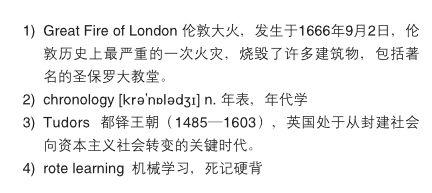戈夫预推英国历史教学改革
2013-07-17ByAllegraStratton
By Allegra Stratton
Reporter: This is school, Victorian style. These 9 and 10-year-olds are on a day trip to Londons Ragged School Museum, but in the future kids this young wont have to be taught about the Victorians, because the way we teach history is changing.
Child A: I liked Romans. I really like the Romans.
Child B: I did like the 1)Great Fire of London.
Child C: The Egyptians.
Teacher: Now sit up!
Reporter: Yes, pay attention. The Egyptians are not on the new curriculum. But the Romans are, and therell be more focus on 2)chronology and knowledge. But why?
Teacher: When I think you are ready…
Nick Gibb (Minister of State for Schools): There is a perception, which I think is real, that children are leaving school without a deep knowledge of the chronology of British history, and…and the history of countries that are important to this country. They tend to repeat the same periods of history over again—the 3)Tudors, and then the…the Second World War, and I think children need to understand the whole of our history if theyre going to really understand Britain.
(Soundbite from “Horrible History”)
Reporter: One successful attempt to get young children interested in history has been the Horrible History series. The programs historical consultant thinks the Governments new curriculum might struggle to engage young minds though.
Greg Jenner (Historian): What Michael Gove is trying to do here feels a bit like a sort of 19th century 4)rote learning type of scholarship, where its all about the kids just absorbing the facts that are flung at them, rather than talking to children, communicating with them.
Teacher: You will learn these facts by repetition. Repeat! Repeat! Repeat! Remember! Remember! Remember!
Reporter: Yes, Miss.
Back in Victorian times it was all about rote learning; the idea of repeating facts again and again until it stuck in your head. Well, critics of Michael Goves plan say that hes heading back in that direction, while supporters think that the balance tipped too far the other way.
记者:这是维多利亚时期的课堂。这些9到10岁的孩子们正在伦敦平民学校博物馆参观,但将来,这样年纪的孩子们也许不用再学习维多利亚时期的历史,因为我们教授历史的方式正在改变。
小孩甲:我喜欢罗马人。我真的很喜欢他们。
小孩乙:我对伦敦大火很感兴趣。
小孩丙:埃及人。
老师:现在坐好了!
记者:是的,注意了。埃及人不在新的课程教纲里了,不过新课程还是会保留罗马人,同时会更注重以编年表为中心的大量历史知识的灌输。不过为什么呢?
老师:当我认为你们准备好了……
尼克·吉布(教育部主管学校事务的大臣):有一种看法——我认为这种看法很有道理——孩子读完书从学校毕业了,却对英国的年代史或是一些与英国历史密切相关的国家的历史知之甚少。他们倾向于不断重复地去学习某一个时代的历史——都铎王朝时期,或者是第二次世界大战时期,但我认为如果孩子们要真正地了解英国,就需要了解我们国家的整个历史。
(《恐怖的历史》中的一小段录音)
记者:《恐怖的历史》系列节目是一个成功的尝试,它激发了孩子们对历史的兴趣。这个节目的历史顾问认为政府的新教程可能会让孩子们很难产生兴趣。
格雷格·詹纳(历史学家):迈克尔·戈夫要尝试的教学改革,感觉像是十九世纪那种对知识不求甚解,死记硬背的学究派,一味地把知识灌输给孩子们,而不是与他们交谈,与他们沟通。
老师:只要重复学习,你们就会掌握这些知识。重复!重复!重复!记住!记住!记住!
记者:好的,老师。
在维多利亚时期,学习就是死记硬背;不断重复学习直到它刻进你的脑袋里。迈克尔·戈夫的反对者说他正朝着那个方向发展,而支持者则认为我们已经在相反的路上走得太远。
新闻链接
迈克尔·戈夫(Michael Gove)自2010年开始担任英国教育大臣以来,就一直倡导英国教育系统改革,其中包括提高考试的难度、加强对本国及外国语言的要求,以及严格区分科学和数学之间的界限。以下几大措施就是由他提出的:
首先,对英格兰地区A-level(普通教育高级证书)的考试进行改革,让考试更加严格,但是减少考试的次数。戈夫指出,目前的A-level考试不能给学生带来所需要的基础知识,苏格兰学生有不同的考试体制,而威尔士和北爱尔兰地区将会自行决定是否要对A-level考试做出改革;其次,汉语将作为选修语种,进入英国7岁以上小学生的必修外语课程;另外,他把目光放在了电子游戏身上,他认为电子游戏可以作为一种让英国教育体系更容易被孩子接受的方式。
近年来,国际教育领域的排名显示英国教育水平有所下降。戈夫希望能用十年的时间大幅度提升英国的学校教学质量。
